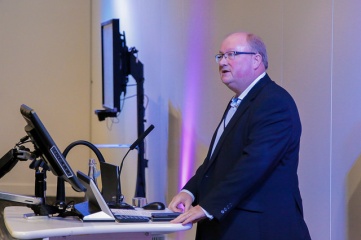Host City: The theme of Host City 2018 is “The Future of Major Events”. What do you think will be the single most important concern for event hosts and organisers in the next five to ten years?
Paul Bush: I believe the single most important concern for event hosts and organisers in the next five to ten years will be how major events contribute to government policy and help bring about long-term transformational change within society beyond just having an economic impact.
No longer can we hold events for events’ sake. They need to reflect the priorities of the wider community and ensure the benefit is felt across the board, not just amongst those immediately connected with the event.
It is about ensuring a 360-degree approach to the planning and delivery of events to ensure policy drivers such as health, education, transport and sustainability are reflected in the event’s overall aims and objectives.
By taking this approach, it will in turn filter down into other key areas that will impact events going forward, including the integrity of the event, security and the role of technology in the viewing and delivery of events.
Host City: How are geopolitical trends and concerns over event governance impacting the distribution of future major events? Where in the world will future investment be strongest? What impact might Brexit have?
Paul Bush: As major events are often bid for and awarded years in advance, considerations of the ever-evolving geopolitical trends and event governance are part of the event planning and delivery process. It’s too early to say what the full impact of Brexit will be but as a global industry, events are well placed to respond to the changes that are likely to come given we are used to operating across national and international borders to deliver events, particularly around major sporting events.
Like everything, the funding landscape is also changing, with sponsorship and grants no longer simply about name rights and brand awareness. Therefore in the future, investment will be strongest where bids can successfully articulate the benefit of events that reflect the values and ambitions of rights holders and sponsors while aligning with government policies to deliver long-term transformational change.
Host City: What can event owners, organisers and hosts do to ensure major events become more financially and environmentally sustainable? How can hosting events create happier, healthier citizens?
Paul Bush: Again I think this comes back to taking a 360 degree approach to the planning and delivery of events. Aligning with government policy, particularly around, health, transport and infrastructure, will ensure major events are more financially and environmentally sustainable as well as helping create happier, healthier citizens.
As a society I think we are more aware of the impact of our carbon footprint so we’re looking for events to reflect value for money by minimise their environmental impact. Take for example the recent European Championships. There was limited capital infrastructure costs because we used existing venues from the Commonwealth Games in 2014. The only new venue built for the Championships was the BMX track, which is the first and only world championships and Olympic standard BMX track in Scotland and only the second in the UK, ensuring a legacy for the sport of BMX in Scotland.
We also want events to leave a lasting personal legacy on our citizens, whether that’s through signposting to activities that can improve both mental and physical health or providing opportunities to gain new skills and experiences through volunteering. So major events now have an important role to play within society beyond just providing an amazing spectacle for people to enjoy.
Host City: What are current trends telling us about the kind of content and formats that will be in demand in the future?
Paul Bush: Current trends are telling us we need to think about content and formats in quite a different way than we previously have. The old broadcast model is increasing becoming outdated and needs to evolve to ensure we continue to engage with fans. Fans want content that is personalised and accessible to them through a range of devices and mediums.
From an event delivery perspective, part of this trend means embracing and experimenting with new platforms – whether that be streaming live events, augmented reality or widening the fan engagement, on the platforms they are already using.
At the root, it is about moving away from thinking about digital as a channel and more as something that is core to the way we manage and run events.
Host City: What are your expectations of Host City 2018 and why should people attend?
Paul Bush: It is great to have Host City 2018 back in Glasgow and Scotland for the fourth consecutive year. I’m once again looking forward to the high calibre of speakers and delegates Host City attracts. This year’s agenda continues to push the industry to delve into the issues we’re facing and having meaningful debate round them.
It is also a great opportunity to network with colleagues from across the sporting, cultural and business events sector in a relaxed and friendly setting. So if you haven’t registered already, I highly recommend you do so now.
As Chairman of Host City 2018, Paul Bush OBE will be delivering the opening keynote address and speaking on the panel “Populations, politics and popularity stakes”. Register your attendance here


